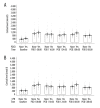A Prospective Cohort Evaluation of the Cortisol Response to Cardiac Surgery with Occurrence of Early Postoperative Cognitive Decline
- PMID: 29453331
- PMCID: PMC5960218
- DOI: 10.12659/msm.908251
A Prospective Cohort Evaluation of the Cortisol Response to Cardiac Surgery with Occurrence of Early Postoperative Cognitive Decline
Abstract
BACKGROUND A recent study reported that patients with higher cortisol levels on the 1st postoperative morning after cardiac surgery exhibited an increased risk of early postoperative cognitive decline (POCD). Therefore, we conducted the current study to gain further insight into the stress response to a surgical procedure as a potential risk factor for early POCD after cardiac surgery. MATERIAL AND METHODS This prospective cohort study enrolled 125 patients undergoing elective cardiac surgery with or without cardiopulmonary bypass (CPB). Patient serum cortisol levels were determined 1 day before surgery (at 08: 00) and on the 1st (at 08: 00, 16: 00 and 24: 00), 3rd (at 08: 00), and 5th (at 08: 00) postoperative days. A battery of 9 neuropsychological tests were used to assess the participants 2 days before the surgical procedure and on the 6th postoperative day. POCD was defined as a decrease in performance of 1 SD or greater between the postoperative and preoperative z scores on at least 1 neuropsychological test. A mixed-design ANOVA was used to determine the correlations of the perioperative cortisol levels with the occurrence of POCD and with the surgical technique performed. RESULTS Mixed-design ANOVA showed no statistically significant differences in the cortisol levels between non-POCD and POCD patients (F=0.52, P=0.690) or between patients with and without CPB (F=2.02, P=0.103) at the 6 perioperative time points. CONCLUSIONS The occurrence of early POCD and the use of CPB were not associated with significantly higher cortisol levels in the repeated measurement design.
Conflict of interest statement
None.
Figures


References
-
- Newman MF, Kirchner JL, Phillips-Bute B, et al. Longitudinal assessment of neurocognitive function after coronary-artery bypass surgery. N Engl J Med. 2001;344:395–402. - PubMed
-
- Knipp SC, Matatko N, Wilhelm H, et al. Cognitive outcomes three years after coronary artery bypass surgery: Relation to diffusion-weighted magnetic resonance imaging. Ann Thorac Surg. 2008;85:872–79. - PubMed
-
- Steinmetz J, Rasmussen LS. Peri-operative cognitive dysfunction and protection. Anaesthesia. 2016;71(Suppl 1):58–63. - PubMed
MeSH terms
Substances
LinkOut - more resources
Full Text Sources
Medical

